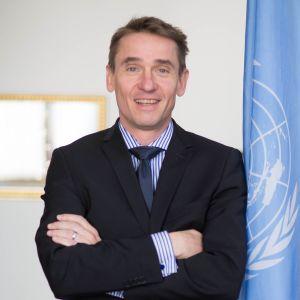Today’s conference on social housing and urban development is timely.
A few days from now, on Monday in Geneva, the Government will be holding it’s once-every four years meeting with the Human Rights Council to undergo the Universal Periodic Review process. In the report that the Government submitted, it has highlighted the importance of social housing, especially for women and their families who have suffered domestic violence and who need safe space, as well as for members of the Roma and Egyptian communities, for whom housing is a particular challenge.
The Government highlighted the importance of housing for those who find themselves – unjustly – excluded from communities or targeted by discrimination, such as members of the lesbian and gay community. The United Nations team here in Albania – in its submission to the Human Rights Council – further noted the need for housing for refugees and migrants. Housing – shelter – is a human right, it’s a basic need. It is recognized in the Universal Declaration of Human rights, celebrating this year its 70th anniversary. Article 25 of that same declaration states “(1) Everyone has the right to a standard of living adequate for the health and well-being of himself and of his family, including food, clothing, housing and medical care and necessary social services.”
Not only is social housing a human right, but -- as is evidenced by this statement -- housing is a critical element within a broader understanding of social protection. Needless to say, the Sustainable Development Goals have recognized it as well, in particular through goal 11, for which the very first target is – by 2030 – “adequate, safe and affordable housing” for all. While others will speak today in more detail about the link the to SDGs, I would like to emphasize the “for all” element of this target – the goal is not to increase access a little bit, an additional project here or there, but to make sure everyone has safe housing where they can raise their children and pursue their dreams. Unfortunately, there are no short-cuts here to achieve, by 2030, this assurance that everyone has access to safe housing. Housing is not cheap – and meaningful social protection cannot be done without real resources. Here in Albania, last year’s UN study on accelerating SDG achievement highlighted the need for increased expenditure on social projection. As a share of its wealth, Albania spends significantly less than its European neighbors. In 2015 Albania spent 11.9% of its GDP on social protection – including health care – whereas Croatia spent over 20% of its GDP on social protection, and Austria, Greece and Italy all above 25%.
Our same report highlighted that the Government collects as revenue a smaller share of GDP than those same neighbors – and obviously the Government needs more revenue if it is to invest more in social protection and housing. Raising more revenue means better government capacities and better data – this for example might enable more income tax and less regressive VAT taxing. But it also requires more trust in government. If citizens are going to be comfortable with higher Government budgets, they need to have greater faith in where their money is going. This suggests more efforts in transparency, more participatory budgeting, more open data, more community engagement in governance, equity in access to services, and so on. The good news is that Albania has laid the groundwork for major improvements in housing. Last year it passed an important Law on Social Housing – something that will be highlighted Monday in Geneva. In the Government’s Action Plan for Roma and Egyptian, specific measures are foreseen for housing, which is important because INSTAT statistics suggest that up to 15% of the Roma households live in a non-conventional housing.
Fear of being evicted and financial difficulties to pay for the mortgage, the rent or the utilities are too common among Roma households. And progress has been made on the ground, too, as for example in Tirana which Mayor Veliaj will explain. Roma “barracks” that I visited in Shkoza just two years ago with the Deputy High Commissioner for Human Rights and the People’s Advocate at the time are no longer there – with instead new houses, safely protected from the river and the weather. The UN has been pleased to assist both specifically on housing and in related areas.
UNDP provided support for the development of the Social Housing Strategy 2016 – 2025 and its 10- year costed Action Plan, as will be discussed in more detail in subsequent panels. With support from the European Union and – through a different project – through the Swiss Government, UNDP is working with Roma and Egyptian communities in particular, including for social protection, employment and community infrastructure – all of which can lead to improved housing outcomes. Several UN agencies have been involved in efforts focused on the results of gender-based violence and how to protect women and their families who need to seek shelter, including UN Women and UNDP. UNHCR has been advocating for the rights of refugees. And of course, today’s project is also a UN collaboration – between the UN Economic Commission for Europe, UN Habit and UNDP. Albania is making progress, and we are proud to be their partner. But if Albania is to make its mark towards Agenda 2030 – to ensure that everyone has access to safe housing – more needs to be done.


















